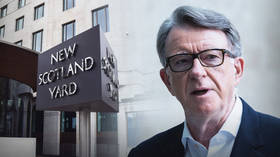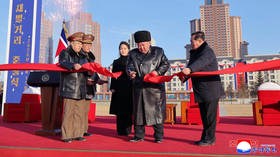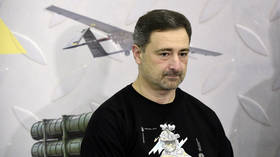UN passes new sanctions against Iran
The UN Security Council has approved new sanctions against Iran over its controversial nuclear program.
This fourth round of sanctions is tougher than past penalties and the previous third round imposed on Iran.
The new sanctions call for a ban on Iran pursuing any activities related to ballistic missiles that are capable of delivering nuclear weapons, bars Iranian nuclear-related investments and activities, and prohibit Iran from buying several categories of heavy weapons such as attack helicopters and missiles.
The resolution was approved with 12 votes in favor, two votes against from Brazil and Turkey, while Lebanon abstained.
The Russian envoy to UN, Vitaly Churkin, said Russia hopes that Tehran will finally show true readiness for negotiations with the Sextet.
However, he mentioned that “in building the nuclear power plant in Bushehr, Russia – not just in words, but in action – has supported Iran's fundamental right to develop its peaceful nuclear program.”
“Unfortunately, our intensive efforts have not received an appropriate response from Iran,” Churkin added.
Following the adoption of new UN sanctions against Tehran, Russia has frozen arms export deals with Iran.
“The decision of the UN Security Council is binding for every country, and Russia is no exception. Naturally, the contract for the S-300 air defence missile systems with Tehran will be frozen as well,” a source close to the Russian arms export regulator told Interfax news agency.
International reaction
The sanctions are supposed to remind Iran that it risks finding itself in international isolation, warned US President Barack Obama on Wednesday.
The US has appointed a senior official to lead a government-wide effort to monitor the effectiveness of sanctions against Iran, Secretary of State Hillary Clinton said.
“We continue, as the president just said in his remarks from the White House, to hold open the possibility of engagement to Iran,” Clinton stated. “Our goal is not to punish Iran. Our goal is not to sanction Iran. Our goal is to end any doubts and questions about the purpose of Iran’s nuclear program and to prevent Iran from obtaining nuclear weapons.”
Adoption of sanctions against Iran is “weakening the UN Security Council,” said President Luis Ignacio Lula da Silva of Brazil, which voted against the sanctions.
An agreement Brazil and Turkey reached with Tehran in May provided for the export of low-enriched uranium from Iran in exchange for 20% enriched nuclear fuel. That earlier agreement, Lula said, opened “possibilities for a dialogue… [but] those who supported the sanctions showed that they did not want to hold negotiations.”
According to the Brazilian ambassador to the UN, these sanctions “will send a false signal” to Iran. She stressed that “the situation has changed” since Brazil, Turkey and Iran signed an agreement on uranium, and there is no reason to approve the sanctions.
Iran has to fulfill all requirements of the UN Security Council and to cooperate with the IAEA in order to resolve concerns about Tehran’s nuclear program, said UN Secretary General Ban Ki-Moon.
"This will become a significant step in restoring the international community’s trust in the purely peaceful goals of the Iranian nuclear program,” read a statement from the Secretary General.
Israel is satisfied with the UN Security Council’s decision about sanctions against Iran.
“For the first time in many years, finally the decision has been made,” said Israeli Foreign Ministry Avigdor Lieberman told Davidzon radio, according to Itar Tass. “It is far from what we thought of and what we wanted, but it is a serious step forward.”
The decision, he added, is “a great success of, first of all, American diplomacy.”
The decision is an “important time for international diplomacy,” said German Chancellor Angela Merkel.
For over two years the international community was striving for more transparency in Tehran’s nuclear program, but Iran refused to take steps toward this, Merkel said.
The UN Security Council resolution “is not aimed against the people of Iran,” she emphasized.
“This is a wrong and unconstructive step. It will not help to solve the nuclear problem, but only will make the situation worse,” said Iranian foreign ministry spokesman Ramin Mehmanparast.
The President of the Islamic Republic, Mahmoud Ahmadinejad, claimed that Tehran will stand out despite the UN resolution, and stressed that Iran has already got used to the sanctions.
Background
The document, based on a proposal by the US, was changed earlier in accordance with opinion of the so-called “5+1” (the five permanent members of the UN Security Council and Germany) and the rotating members of the Security Council.
The Iranian nuclear issue became further strained after February 11, when Iranian President Mahmoud Ahmadinejad claimed that Tehran had enriched uranium up to 20 percent and had the potential for producing uranium with a higher level of enrichment.
In May, an agreement was reached between Iran, Turkey and Brazil on the exchange of uranium on Turkish territory. According to this document, Tehran would ship 1,200 kilograms of its low-enriched uranium to Turkey in exchange for 120 kilograms of nuclear fuel for a Tehran research reactor.
Russia, the US and France, in turn, expressed their concerns about the agreement to the IAEA, arguing that it would not resolve doubts about Tehran’s nuclear program.
Earlier Russia, France, the US and IAEA proposed to Iran to enrich uranium in Russia, but Tehran declined the proposal, saying that the Western countries were not reliable, and demanded the exchange be synchronized and held on its own territory.
Western countries claimed Iran didn’t have flexibility and the will to solve the nuclear question. As a result, the US began to push for tougher sanctions against the Islamic Republic.
Before the resolution was approved, the Iranian president stated that his country will not continue talks on its nuclear program if the sanctions are passed.
He also called the agreement with Turkey and Brazil the “last chance” for Western countries to solve the nuclear question.
The US and its Western allies believe Tehran's real goal is to build nuclear weapons. But Tehran insists its nuclear program is peaceful, aimed at producing nuclear energy and medical isotopes.












